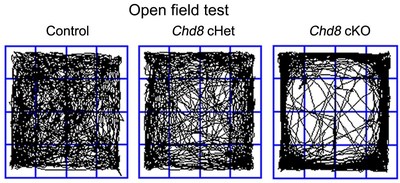Closer Study of Major Autism Gene Suggests Possible Treatment Approach
Closer Study of Major Autism Gene Suggests Possible Treatment Approach
PR Newswire
CINCINNATI, Sept. 23, 2022
In adult mice with loss of CHD8 gene function, FDA-approved drug partially restores disrupted brain cell production
CINCINNATI, Sept. 23, 2022 /PRNewswire/ -- Research led by a scientist at Cincinnati Children's who primarily studies brain tumors may open doors for improved treatment of autism.
Autism spectrum disorder (ASD) affects about one in 40 children between ages 3 and 17, according to the National Survey of Children's Health. Those affected often experience difficulty socializing, impaired language development, repetitive behaviors, and other symptoms. Of those tested for various genes linked to the condition, nearly everyone with disruptive mutations of the gene CHD8 has autism.
Now a study led by Qing Richard Lu, PhD, Beatrice C. Lampkin Endowed Chair in Cancer Epigenetics and Scientific Director of the Brain Tumor Center at Cincinnati Children's, sheds new light on the role CHD8 plays in brain development—both during embryonic growth and much later during adulthood. The study, published Sept. 23, 2022, in the Journal of Neuroscience, also reports that the FDA-approved antidepressant fluoxetine (marketed as Prozac) partially restores lost brain cell production, also known as neurogenesis, in mice lacking CHD8.
"This is an exciting first step, but we need to further confirm these findings with more studies in a variety of mouse models," Lu says. "Longer term, it also would require large scale clinical trials before a treatment could be approved for human use."
Lu is a widely respected brain tumor expert who has devoted years to understanding how the brain forms and how brain development can go wrong. In previous work, his lab team became interested in how malfunctioning CHD8 genes could disrupt formation of myelin sheaths that protect and support rapid signaling between nerve cells in the brain and central nervous system. Then the team began wondering how CHD8 affects how the nerve cells themselves are formed.
Among the many details in the study, the researchers found that the effects caused by disrupted CHD8 function vary considerably depending on when the disruption occurs. In mice, when CHD8 is missing from the start, brain development is deeply affected, especially in the formation of the cortex, the area that controls social behavior, thinking and problem-solving, and the hippocampus, which supports learning and memory. Many embryos with this early-stage gene deletion exhibit severe brain defects. The mice with loss of CHD8 function in the brain develop several classic autistic behaviors, including avoiding others. The effect was striking when mapping the movements of normal control mice and those that had lost CHD8 function as adults.
However, the gene's function also can be disrupted at other points of development, be it during late-term pregnancy, youth, or adulthood. The team found ways to cause these disruptions in mice at different age points, then analyzed the effects. In the adult mice, CHD8 loss also impairs neurogenesis from neural precursor cells.
With Prozac being one of the most widely studied antidepressants, the team already knew that the drug had been found to stimulate nerve cell growth. When they gave the drug to the mice with the CHD8 loss, they found that nerve cell production resumed. The restoration was not complete but was powerful enough that the drug merits closer study as a potential way to augment neurogenesis in CHD8-deficiency, Lu says.
Now Lu's lab is working on expanded research involving multiple lines of mice that have been developed to mimic ASD conditions. They are analyzing changes in behavior against varying doses and timepoints of treatment, and more.
Three members of Lu's lab were co-first authors on this study: Chen Dong, Chuntao Zhao, and Xiang Chen. Several other colleagues from the Divisions of Development Biology and Experimental Hematology and Cancer Biology contributed. Collaborators also included scientists with Children's Hospital of Fudan University, Shanghai, China, and the University of California San Francisco.
This study was funded by Cincinnati Children's Research Foundation award and a National Institutes of Health training grant (2T32CA117846-11A1).
![]() View original content to download multimedia:https://www.prnewswire.com/news-releases/closer-study-of-major-autism-gene-suggests-possible-treatment-approach-301632356.html
View original content to download multimedia:https://www.prnewswire.com/news-releases/closer-study-of-major-autism-gene-suggests-possible-treatment-approach-301632356.html
SOURCE Cincinnati Children's Hospital Medical Center












